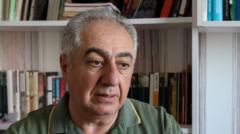Azerbaijan’s Hosting of COP29 Raises Human Rights Concerns
The global climate summit COP29, currently taking place in Azerbaijan, has drawn significant criticism from human rights organizations for the government’s alleged crackdown on environmental activists and political opponents. This marks the third consecutive year that a COP host country has faced accusations of oppressing civil society.
Human rights groups report a dramatic increase in political repression since Azerbaijan was announced as the host. The Union “For Freedom of Political Prisoners in Azerbaijan” indicates that the number of political prisoners, including journalists, environmental activists, and opponents, has exceeded 300 for the first time since the early 2000s.
Several notable cases highlight the alleged oppression:
1. Gubad Ibadoglu, a 53-year-old London School of Economics professor researching Azerbaijan’s energy sector, was arrested in summer 2023 on fraud charges. Human Rights Watch has called these charges “dubious,” and Ibadoglu remains under house arrest.
2. Anar Mammadli was arrested in April on smuggling charges, just two months after co-founding an organization advocating for greater alignment with the Paris climate agreement.
3. Nazim Beydemirli received an eight-year prison sentence after protesting gold mining operations near his village, with his lawyer arguing the charges are baseless.
Environmental activists argue that Azerbaijan’s continued reliance on fossil fuels contradicts the spirit of a climate conference. The country’s oil and gas sectors finance approximately 60% of the government’s budget, and President Ilham Aliyev recently referred to oil and gas as a “gift of god” during the conference.
The Azerbaijani government denies these allegations, with President Aliyev’s Special Envoy Elchin Amirbayov stating that the country does not differentiate between state and non-state actors’ participation.
International bodies have expressed concern. The European Parliament condemned Azerbaijan’s “repression” of activists and journalists, deeming its human rights record incompatible with hosting COP29.
The United Nations has attempted to address these issues by including human rights provisions in this year’s Host Country Agreement. However, critics argue that the UN lacks the power to enforce these provisions.
Climate Action Network emphasizes that protecting civil society is crucial for meaningful progress on climate change. Tasneem Essop, the network’s executive director, highlighted civil society’s critical role in advancing climate initiatives, such as establishing the loss and damage fund.
The situation raises broader questions about the selection process for COP host countries. Currently, hosts are chosen by regional consensus, with no clear mechanism to prevent countries with poor human rights records from hosting.
As the conference continues, the tension between diplomatic engagement and human rights concerns remains a significant challenge for the international community.



